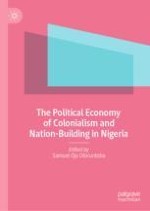2022 | OriginalPaper | Chapter
4. Imperial Citizens or Economic Nationalists? An Analysis of Colonially Restructured Northern Nigerian Economy in the 1940s
Author : Stephen Yohanna
Published in: The Political Economy of Colonialism and Nation-Building in Nigeria
Publisher: Springer International Publishing
Activate our intelligent search to find suitable subject content or patents.
Select sections of text to find matching patents with Artificial Intelligence. powered by
Select sections of text to find additional relevant content using AI-assisted search. powered by
